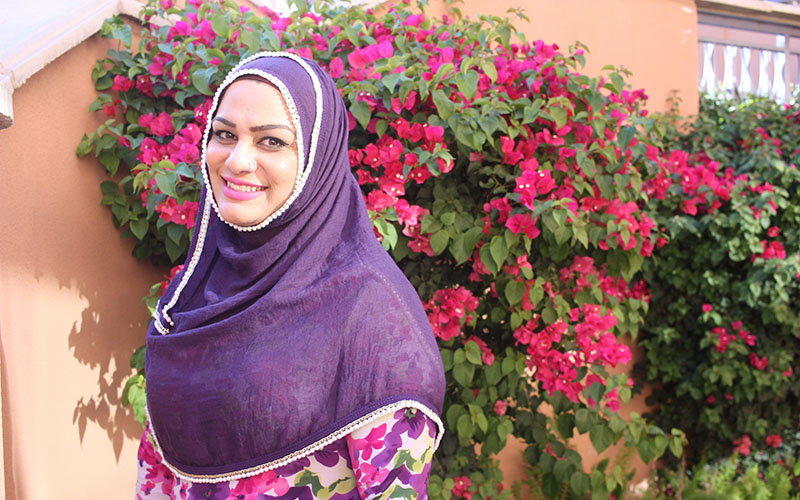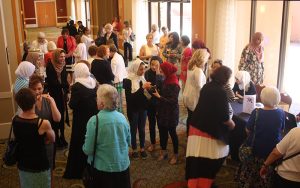
Tahera Ahmad, associate chaplain and director of interfaith engagement at Northwestern University, spoke to more than 160 women Sunday about some of her experiences growing up that shaped her identity as a Muslim woman. (Photo by Sarah Jarvis/Cronkite News)
SCOTTSDALE — Tahera Ahmad was in the middle of a high school basketball game in the early 2000s when the referee blew his whistle and kicked her off the court for wearing a hijab.
Ahmad, the point guard and a senior at her Chicago high school, had worn her hijab with her basketball uniform at each game for the previous three years — and in front of the same referee. But in the aftermath of 9/11, her headscarf (worn in public by some Muslim women) became a point of contention.
Ahmad’s coach, a devout Christian man, yelled at the referee, accused him of being a bigot, and convinced him to let Ahmad play. Afterward, one of the parents watching told Ahmad she shouldn’t have been let back in the game.
Then when Ahmad was an adult working at a pharmacy in Skokie, Ill., an elderly customer refused to accept her prescription from Ahmad and called her a “ragheaded Muslim girl.” Ahmad’s boss, a Jewish man, told the customer she would not be welcome at the pharmacy if she did that again.
Those two experiences stuck with Ahmad, an associate chaplain and director of interfaith engagement at Northwestern University, and the keynote speaker at the “Springtime Tea Party: An Interfaith Celebration of Women” event at the Scottsdale Marriott at McDowell Mountains hotel on Sunday.
“Despite our differences, they stood up for me,” Ahmad said. “We have to keep knowing each other, we have to build bridges with each other, and we have to stand up for each other.”
The event, hosted by the Islamic Speakers Bureau of Arizona, brought together more than 160 women of various religious backgrounds and ages to discuss discrimination, allyship and unity, while drinking tea and eating finger sandwiches.
Before her speech, Ahmad offered a recitation of the Quran, performing verses that were specific to women. Photography was not allowed during the program because some women opted to remove their hijabs since no men were in the room.
Ahmad emphasized the importance of making personal connections with members of other faiths.
“Facts do not change people, relationships change the hearts of people,” she said.
Ahmad said she was excited to speak at this event because women have “such an incredible ability to connect with each other at so many different levels.”
“We’re able to be vulnerable at a whole deeper level with each other, and I think that’s so important for interfaith conversations,” she said. “You just get rid of all the fluff from the beginning, and you’re able to connect at that deeper level right away.”
She said a lot of Americans have shown that they want to reach out to minority communities, especially post-election, but often don’t know how to do that. Events like these, she said, allow those people to make those connections at their own pace and at their own comfort.
“Extremism exists in every religion or every ideology,” Ahmad said. “To me, patriotic Americans are the ones who recognize all of the greatness that this country has to offer … and how we can share that together by ensuring safety and equality and security for everyone.”

Women from various religious groups around Arizona stand outside a ballroom at the Scottsdale Marriott at McDowell Mountains resort for the “Springtime Tea Party: An Interfaith Celebration of Women” event. (Photo by Sarah Jarvis/Cronkite News)
Each attendee received a bracelet for the first part of the program, in which Azra Hussain, founder and president of the ISBA, asked the audience a series of questions ranging from “did you have a pet growing up?” to “have you ever taken care of a terminally ill person or been terminally ill yourself?”
The questions were meant to help participants recognize the things they had in common with each other, and they received a bracelet charm for each “yes” response.
Throughout the program, women hugged, exchanged contact information and extended dinner invitations. This was the ISBA’s first event just for women.
“As soon as we said it’s a ladies-only tea party, we literally had to double the size of the room,” Hussain said.
She said women improve society when they lift each other up.
“I heard from somebody one time that a woman is the heart of her family,” Hussain said. “If a woman is the heart of her family, women are the heart of their community and of society.”
Tina Olson, a professor at Arizona State University and member of the Paradise Valley United Methodist Church, said she is concerned with the way the current administration has “denigrated” minority communities, particularly Muslims.
“We’re all God’s children,” she said. “We love everyone.”
Kris Nyman, a retired teacher and member of the Church of the Beatitudes, said she tends to monitor herself more in front of men, so it was refreshing to “be more of ourselves” with other women.
“A lot of women can’t be themselves as much when there are men around,” she said.
Ahmad closed the program by reciting a “nasheed,” a narration of the words of the Prophet Muhammad through song. The room was quiet during her recitation and applauded enthusiastically when she finished.
She ended her keynote speech with a challenge for the audience to get to know three people from a faith other than their own this year. She said learning about each other’s shared values will make it easier to show “empathy during adversity.”
“Teatime empathy is easy,” Ahmad said. “The real empathy we need to show each other is during times of difficulty.”